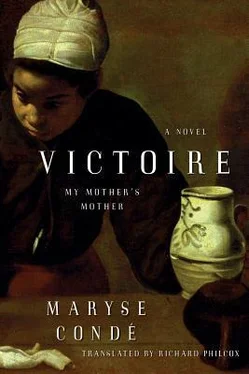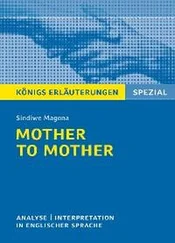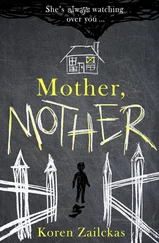Her heart had jumped, that’s for sure. But in the end, what purpose had it served? Nobody had come out of it unscathed and she had not protected the girl she worshipped.
WHAT DISGUSTS ME in all this is that Victoire was never considered a victim. I can excuse Thérèse, who was blinded by her own grief. But as for the others, there was not a moment of compassion. Victoire was just sixteen. Statutory rape. Dernier was twice her age. He was educated, and a respected, even well-known notable. Everyone treated her like a criminal. I like to think that she hid her tears in her attic, revolted by her pregnancy, but not complaining, crushed by her solitude and convinced of her insignificance. Perhaps too she was expecting Thérèse to say something, but she never did.
“Here we are the two of us, both taken for a ride. At least you carry the future in your womb. Me…”
Fulgence demanded Oraison come and take back his daughter. She had disrespected the sanctity of his home. Oraison turned up at eight in the morning — he hadn’t gone to sea that day — flanked by Lourdes. Informed of her crime, he flung himself on Victoire and gave her such a slap that she fell to the ground, her mouth covered in blood. He then vented his anger by kicking and punching her. Under the terrified gaze of Gaëtane, Fulgence had to hold him back.
If he wanted to kill his child, let him do it elsewhere. There would be no bloodshed on his floor.
Without a farewell, without a thank-you, and, most significantly, without a penny, Victoire left the home where she had toiled for over six years, hugging the wicker basket containing the loose golle dresses and matador robe that Thérèse had forgotten to take back.
Poor Thérèse was in agony. Her monogrammed sheet pulled up over her head, she had been weeping and sobbing since the day before. She refused to open her door to Gaëtane, who was primarily concerned with the humiliation.
“Oh my goodness! People will laugh at us.”
“Oh Lord! How will I be able to look at people at high mass?”
“Jesus, Mary, and Joseph, mercy on us!”
Thérèse did let Danila in; she was carrying a woman weed herb tea. Thérèse took the cup with trembling hands.
“I pati?”
Danila nodded that Victoire had left and there followed a long, uncomfortable moment.
Two months later Thérèse booked a category two first-class cabin on board the Louisiane, a steamship belonging to the Compagnie Générale Transatlantique. With no regard for her parents’ grief, whom she was never to see alive again, she journeyed to France, where she lived for the rest of her life. Something was broken inside her. She had lost her savoir-faire and her assurance. She bought a two-bedroom apartment on the rue Monge, opposite the Lutetia amphitheater, and earned a mediocre living by giving music lessons to children of the colored bourgeoisie. Accompanying herself on the piano, she would hum the well-known melody that was still very topical:
J’ai pris mon coeur, j’ai donné à un ingrat,
A un jeune homme sans conscience
Qui ne connait pas l’amour
Ah! N’aimez pas sur cette terre
Quand l’amour s’en va, il ne reste que les pleurs!
She kept quiet about that period of her life. As a rule, seated at the piano, she would sum it up thus with her sweet, broken voice:
“I nursed a viper in my bosom and it bit me. My life is over. That’s all I can say.”
Sometimes between scales she became worked up and asked in a tone of despair:
“Why? Why me? I did nothing to deserve such a blow dealt by fate. I was pure. A virgin. Naive.”
She never married.
ORAISON WAS WALKING in front, his chest puffed out in anger. Wretched females whose bellies bear nothing but shame upon shame! Behind him came Victoire and the sympathizing Lourdes. On leaving the town, where the Maurice Bishop Center now stands, Lourdes linked arms affectionately with her niece, who nestled against her side. Unfortunately, at that very moment, Oraison turned round and caught their gesture of affection. He sent them both flying, one to the right, the other to the left. Victoire lost her balance, fell into the ditch, and twisted her ankle. Thank God, her baby was unharmed.
In the space of a few years, La Treille had undergone major changes. Half of its inhabitants had emigrated to the mainland of Guadeloupe, leaving their cabins to go to ruin. Cut grass and sensitive plants filled the once Creole gardens. The trees were overgrown with creepers. The white blossom of the Santo Domingo briar rivaled the lilac flowers of the gliricidia. No longer were there oxen grazing under the hogplum trees. No longer any oxcarts, arms lowered, waiting to be loaded. There reigned an atmosphere of desolation. When Oraison had been in such a hurry to move in with Isadora, Félix, Chrysostome, and Lourdes had not tolerated the insult to the memory of Caldonia. In unison they moved to a cabin at the other end of the hamlet. Then Félix and Chrysostome each set up house with a woman and went their separate ways. Since Félix was Victoire’s godfather, that was where Oraison brought the criminal, throwing her at his feet with a kick. Félix had given Victoire her baby formula; he had given her piggybacks and carved oxcarts from an avocado pit. Victoire was not the first and would not be the last to push in front of her the belly she got on credit. It was a mode that was here to stay, and stay for a long time, that’s for sure. Deep down in his heart, Félix believed she should be spared. Blame should be placed above all on the wickedness of these Grands Nègres, these sermonizers, who were no better than the small-time blacks, even the maroons. But Destinée, his companion, couldn’t put up with this slut under her roof and he had to give in.
Lourdes asked for nothing better than to inherit Victoire. But money was cruelly lacking. How could she feed yet another mouth? After much reflection, they came up with an idea.
Up till then, Victoire had escaped the bondage of working in the sugarcane fields. Now it was the only way out. Since she had never handled a hoe or a cutlass, she would offer her services as a cane bundler. All they needed to do was make a dress and mittens from pieces of jute and old rags. The two women labored all night and in the gray of the dawn set off for the plantation.
It was harvesttime.
The sun was still hiding coyly in a corner of the sky. Yet already dozens of men and women in rags were busy working. The carts drawn by oxen drained of their force trundled through the cane pieces. Not anyone can be a cane bundler. The job is carried out by federations, genuine convoys of olden times, made up of elderly women, even very old women, who are too worn out for weeding and clearing.
Did José the foreman, a mulatto himself, take pity on Victoire’s belly?
Whatever the case, he accepted her request, and under a sun growing bolder by the minute, she braved exhaustion, the sting of the cane, and dizziness in order to deliver her bundles of sugarcane.
It was Lourdes who was so happy! Hoisting up her skirt over her bow legs the color of kako dou, she indulged in so much tomfoolery that she managed to get a smile out of Victoire.
Coming after so many bad days, the evening was blissful. And the following night even more blissful.
Alas! The following morning, no sooner had they set foot in the field than a song rose up amid the laughter and vulgar jibes. It was about a mulatto girl, a slut fallen on hard times, who, after having had her fill of men, stole the bread out of the mouths of her poor black neighbors. Victoire took to her heels and fled.
This was the first and last experience my grandmother had of the cane fields.
Even so, she never gave up. Despite the condition of her rounding belly, she was constantly looking for work. Shortly afterward, her real life began. I next find her as a cook in the service of Rochelle Dulieu-Beaufort, the wife of the owner of the sugar factory at Pirogue. Cook! Let us confess it was a bold claim, since at the Jovials, we may recall, all she ever did was help Danila. Yet from the very first day her destiny took shape. She proved to have an incomparable gift. She won over the Dulieu-Beaufort family with a cream of pumpkin and black crab soup. The Dulieu-Beauforts symbolized the reversal of fortune undergone by certain white Creoles. They had in turn grown tobacco and indigo and set up a coffee plantation, which, according to them, produced the best coffee in Guadeloupe. One of their relatives, a friend of Dominique Guesde who, like him, was a dilettante writer, had invented the slogan:
Читать дальше












